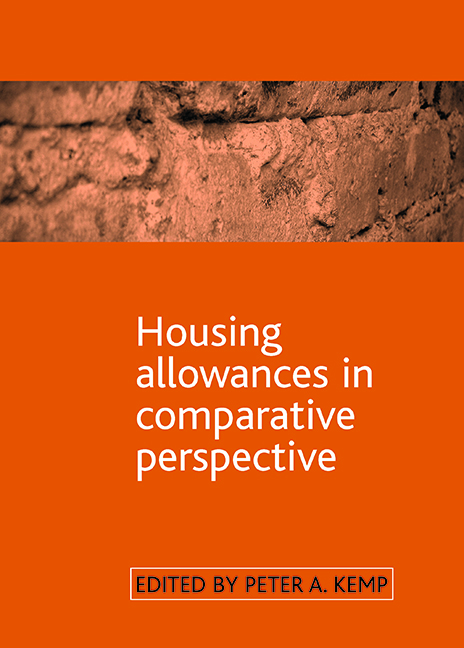Book contents
- Frontmatter
- Contents
- List of tables and figures
- Acknowledgements
- Notes on contributors
- one Housing allowances in context
- two Housing allowances and the restructuring of the Australian welfare state
- three The New Zealand experience of housing allowances
- four Canadian housing allowances
- five Housing allowances American style: the Housing Choice Voucher programme
- six Housing Benefit in Britain: a troubled history and uncertain future
- seven Housing allowances in France
- eight Housing allowances in Germany
- nine Housing allowances in the Netherlands: the struggle for budgetary controllability
- ten Housing allowance systems in Sweden
- eleven Housing allowances in the Czech Republic in comparative perspective
- twelve Housing allowances in the advanced welfare states
- Index
eleven - Housing allowances in the Czech Republic in comparative perspective
Published online by Cambridge University Press: 15 September 2022
- Frontmatter
- Contents
- List of tables and figures
- Acknowledgements
- Notes on contributors
- one Housing allowances in context
- two Housing allowances and the restructuring of the Australian welfare state
- three The New Zealand experience of housing allowances
- four Canadian housing allowances
- five Housing allowances American style: the Housing Choice Voucher programme
- six Housing Benefit in Britain: a troubled history and uncertain future
- seven Housing allowances in France
- eight Housing allowances in Germany
- nine Housing allowances in the Netherlands: the struggle for budgetary controllability
- ten Housing allowance systems in Sweden
- eleven Housing allowances in the Czech Republic in comparative perspective
- twelve Housing allowances in the advanced welfare states
- Index
Summary
Introduction
The aim of this chapter is to describe the development and functioning of housing allowances in the Czech Republic. After a short introductory description of the Czech housing system and policy, an evaluation of the allowance model is provided in two steps: first, by measuring the effectiveness of the allowance; and, second, by comparing the Czech model with the approaches applied in other transitional countries.
Under the communist regime, housing in the Czech Republic was subject to tight state control. With the exception of family houses, the entire privately owned housing stock was nationalised; subsequently, the creation of new housing cooperatives was allowed. Housing cooperatives were subjected to state administration and all rents were controlled by the state. Housing production was mostly shaped by the state, and as a result of the extensive housing construction programme financed from the state budget, the share of state rental flats in the total housing stock grew rapidly. The physical and aesthetic quality of these new flats, however, was very poor, with large concrete housing estates creating a new urban landscape. State housing policy in this period was based on the principle that a flat is such an important good in the life of a person, that the increase in construction, maintenance and management costs should not be reflected in household expenditures or rent increases. In the case of state dwellings, the rent was fixed at the level of 1964 prices through legal regulation. This necessarily resulted in the continually growing volumes of state subsidies for housing construction as well as for the operation, management and maintenance of the existing housing stock. The extensive, state-funded construction, management and maintenance costs of state rental flats were increasingly confronted with limited public resources and, consequently, other tenures (mainly cooperative housing and homeownership) gained in importance.
The ‘stabilisation of cooperative housing construction’ initiative was organised by housing cooperatives. The construction costs were covered using cooperative membership fees (on average approximately 18% of the total construction costs), state subsidies (on average approximately 56% of the total construction costs) and low-interest state bank credits with a 3% interest rate and 30-year maturity (on average approximately 26% of the total construction costs).
- Type
- Chapter
- Information
- Housing Allowances in Comparative Perspective , pp. 239 - 264Publisher: Bristol University PressPrint publication year: 2007
- 1
- Cited by



